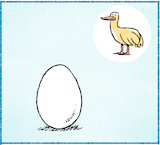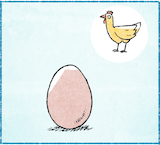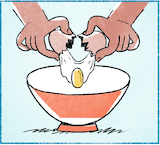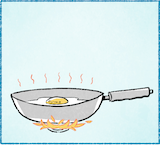



นี้คืออี่หยัง นี้คือไข่ มันเป็นไข่เป็ด ไข่เป็ดน่วยสีขาว เปียกมันสีขาว
เปียกมันแข็งบ่ กะแข็งอยู่ แต่บ่แข็งหลาย แต่เฮากะสามาดปอกได้ หลือเอามากินได้
ไข่เป็ดมันกินได้บ่ กินได้อยู่ เอามาเฮ็ดแนวกิน คนส่วนมากสิกินไข่ เอาไข่มาต้มกิน หลือทอดกินกะได้ หลือสามาดเฮ็ดแนวกินได้อีกหลายอย่าง
7
นี้คืออี่หยัง นี้คือไข่ไก่ ไข่ไก่น่วยสีส้ม บ่ได้น่วยสีขาวคือไข่เป็ด
แต่ว่าไข่ไก่กับไข่เป็ดสิน่วยค้ายๆ กัน แต่ว่าไข่ไก่สิน้อยกว่าไข่เป็ด เปียกกะสิแข็งคือกัน แต่บ่แข็งหลาย เฮากะสามาดแกะได้คือกัน
ไข่ไก่กะกินได้คือกัน เฮ็ดแนวกินได้หลายอย่าง ต้มกะได้ ทอดกะได้ หลือเฮ็ดแนวกินอย่างอื่นกะได้
ไข่ไก่สิมีลาคาถืกกว่าไข่เป็ดแม่นบ่ แม่น ไข่ไก่สิถืกกว่า ถืกกว่าไข่เป็ด
8
เขากำลังเฮ็ดหญัง เขากำลังแกะไข่ หลือตอกไข่
เขากำลังตอกไข่อี่หยัง เขากำลังตอกไข่ไก่ เพาะว่าน่วยมันน่วยสีส้ม
เขาตอกไข่ใส่อี่หยัง เขาตอกไข่ใส่ถ้วย ถ้วยใบสีแดง
ขั้นเขาตอกไข่แล้ว เขาสิเอาเปียกมันไปใส เขากะสิเอาเปียกมันไปถิ้ม เปียกมันกินบ่ได้
เปียกไข่ไก่ หลือเปียกไข่เป็ด มันกินบ่ได้ บ่สามาดกินเปียกได้
ในไข่น่วยหนึ่งมีอี่หยังแน่ ในไข่น่วยหนึ่งกะสิมีไข่ขาวกับไข่แดง
ไข่ขาวกะสิเป็นสีขาว ไข่แดงกะสิเป็นก้อนวงกมที่อยู่ในไข่ขาว เป็นสีแดง
เขาตอกไข่เฮ็ดหญัง เขาอาดสิเฮ็ดแนวกิน เขากะเลยตอกไข่กะได้ เพื่อที่สิเอาไปเฮ็ดแนวกิน
9
เขากำลังเฮ็ดหญัง เขากำลังทอดไข่ เขาทอดไข่อยู่ในกะทะ เขาค้างกะทะอยู่เทิงเตาเก่ดหลือเตาไฟ ตอนนี้ไฟกำลังฮุ่ง กำลังติดอยู่
ตอนนี้ไฟมันแฮงบ่ กะแฮงอยู่ ขั้นไฟบ่แฮงกะเฮ็ดแนวกินบ่ได้
ตอนนี้เขาทอดไข่อี่หยัง เขาทอดไข่ดาว บ่แม่นไข่เจียว
Link to overview page
Link to dictionary
| Isaan | Pronunciation | Tones | Thai | English/Notes |
|---|---|---|---|---|
| นี้ | ni: | HF | นี้ | 1. this 2. here |
| คือ | khʉ: | HR | คือ | 1. to be, to resemble, like, as 2. why {บักหล้าคือบ่เก็บโต่ะแน่ = [addressing a young boy] Why haven't you cleared the table?} |
| อี่หยัง | i:-yaŋ | H-M | อะไร | 1. what {นี้คืออี่หยัง = What is this?} {มื้อนี้เจ้าเฮ็ดอี่หยัง = What are you doing today?} {กินเข้างายกับอี่หยัง = What did you have for breakfast?} 2. something, anything, (in negations) nothing {บ่ต้องเฮ็ดอี่หยังอีกเลยนอกจากใส่ปุย = [we] don't need to do anything besides adding fertilizer} |
| ไข่ | khai | H | ไข่ | egg |
| มัน | man | HR | มัน | it (also used to refer to people) |
| เป็น | pen | M | เป็น | 1. to be, to exist 2. to be able to 3. to suffer, sth. happens to 4. เป็นหญัง[...]คือ in initial position: why? {เป็นหญังเขากะคือแปงฟัน = Why is he brushing his teeth?} {เป็นหญังเคี่ยงบินมันคือสิตก = Why is the airplane falling down?} |
| เป็ด | pet | M | เป็ด | duck |
| น่วย | nu:ai | H | ลูก, ผล | clf. for the fruits (e.g., banana, coconut, lime, papaya, watermelon), vegetables (e.g., chilis), eggs, mountains, the sun |
| สี | si: | M | สี | 1. color 2. colored pencil, crayon |
| ขาว | kha:o | M | ขาว | white |
| เปียก | pi:ak | LF | เปลือก | shell, peel, outer skin Notes: pronunciation: also realized as เปือก |
| แข็ง | khɛŋ | M | แข็ง | hard, strong |
| บ่ | bɔ: | H | ไม่ | 1. no, not 2. question particle, transforming a statement into a question Notes: spelling exception in line with common usage on social media |
| กะ | ga | M | ก็ | 1. then, consequently 2. also |
| อยู่ | yu: | H | อยู่ | 1. to be (located) at 2. yet, still 3. auxiliary indicating continuous or progressive action {ทอดปาอยู่ในกะทะ = (in the process of) frying a fish in the pan} {แม่กำลังเมี้ยนเฮียนอยู่ = mother is cleaning/tidying up the house} |
| แต่ | tɛ: | H | แต่ | 1. but {แต่บ่ต่างกันหลาย = but not very different} {แต่บ่ลู้ว่าเขาญ่างมาแต่ใส = but [I] don't know where he's coming from, see also: แต่ว่า} 2. only {ตอนนี้มีแต่ขี้ฝ้า = now there are only clouds} |
| หลาย | la:i | M | เยอะ, มาก | many, much, very |
| เฮา | hao | HR | เรา | 1. personal pronoun: we 2. personal pronoun: I |
| สามาด | sa:-ma:t | M-HF | สามารถ | can, to be able |
| ปอก | pɔ:k | LF | ปอก | 1. to peel 2. to knock an egg open |
| ได้ | dai | HF | ได้ | 1. can 2. to get, to obtain 3. before verb: indicating past tense 4. บ่ได้ + verb: not |
| หลือ | lʉ: | M | หรือ | or |
| เอา | ao | M | เอา | to take, to give {เขากำลังเอาก่องไปซั่ง = he's taking the boxes to weigh them} {หมอกำลังเอายาให้คนป่วยกิน = the doctor is giving medicine to the patient} {เอาไว้ถ้า = is for, is used for, has the purpose of} |
| มา | ma: | HR | มา | 1. to come 2. auxiliary expressing action towards the present or focal time {กะคุเฮ็ดมาจากอี่หยัง = What is the bucket made of?} {แล้วเขากะเก็บเงินจากพุนั้นมา = and then she takes the money of that person} |
| กิน | gin | M | กิน | to eat, to consume, to use |
| เฮ็ด | het | H | ทำ | to do, to make |
| แนวกิน | nɛ:o-gin | HR-M | อาหาร | food {เฮ็ดแนวกิน = to prepare food} {ตำบักหุ่งเนี้ยกะสิเป็นแนวกิน = papaya salad is (a kind of) food} |
| คน | khon | HR | คน | person, people |
| ส่วนมาก | su:an-ma:k | H-HF | ส่วนมาก | mostly, usually, generally |
| สิ | si | M | จะ | future tense auxiliary {เขากำลังสิตื่น = he's about to wake up} {สิไปตะหลาด = [I'm] going to the market} |
| ต้ม | tɔm | HF | ต้ม | to boil |
| ทอด | thɔ:t | HF | ทอด | to fry |
| อีก | i:k | LF | อีก | 1. more, again 2. other, another |
| อย่าง | ya:ŋ | H | อย่าง | type, kind, sort, category |
| ไก่ | gai | H | ไก่ | chicken |
| ส้ม | som | LF | ส้ม | 1. fruit: orange 2. color: orange |
| แต่ว่า | tɛ:-wa: | H-H | แต่ว่า | 1. but 2. only {ฮู้แต่ว่าเขายืนอยู่พุเดียว = I only know that he's standing there by himself} |
| กับ | gap | M | กับ | 1. and {ลุงกับป้า = uncle and aunt} {กวยเตียวหมูกับกวยเตียวไก่ = noodle soup with pork and noodle soup with chicken} 2. with, to {ค้ายๆ กับคำว่า ... = similar to the word ...} 3. prefix in front of foods {กับเข้า = side dishes eaten with rice} {เขากินกับกวยเตียว = he's eating noodle soup} |
| ค้าย | kha:i | HF | คล้าย | to resemble, to be similar, to be alike {ทัพพีเป็นค้ายๆ กับซ้อน = a ladle is similar to a spoon} |
| กัน | gan | M | กัน | mutual, each other, with another, together {เขากำลังนั่งเว้ากัน = they're sitting and talking} {เขาสองคนฮักกัน = they love each other} {ปาสองโตนี้ ใหญ่ห่างกันหลายบ่ = These two fish here, are they very different in size (from each other)?} {ต่างกัน = to be different (from each other)} {ก่องอันไหนหนักกว่ากัน = Which box is heavier (than the other(s))?} |
| น้อย | nɔ:i | HF | น้อย | 1. few, little 2. small |
| กว่า | gwa: | H | กว่า | more, more than, comparative: as, than |
| คือกัน | khʉ:-gan | HR-M | เหมือนกัน | 1. also, likewise, similarly {ยินดีที่ได้ฮู้จักคือกันคับ = Nice to meet you too!} 2. in negative sentences: either {บ่ลู้คือกัน = I don't know either} {จักคือกัน = I don't know (either)} |
| แกะ | gɛ | M | แกะ | 1. to unpack, to unwrap 2. to remove, to take out 3. to peel |
| อื่น | ʉ:n | H | อื่น | other |
| มี | mi: | HR | มี | 1. to have 2. there is |
| ลาคา | la:-kha: | HR-HR | ราคา | price |
| ถืก | thʉ:k | LF | ถูก | cheap, inexpensive |
| แม่นบ่ | mɛ:n-bɔ: | H-H | ใช่ไหม | question particle: ..., right? ..., isn't it? ..., don't you? etc. {เจ้าได้เห็นสิ่งนั้นแม่นบ่ = You've seen that, haven't you?} {ฝนกำลังตกแม่นบ่ = It's raining, isn't it?} {นี้คือกะคุแม่นบ่ = This is a bucket, isn't it?} |
| แม่น | mɛ:n | H | ใช่ | 1. yes 2. affirmative particle |
| เขา | khao | M | เขา | personal pronoun: he, she |
| กำลัง | gam-laŋ | M-HR | กำลัง | auxiliary indicating continuous or progressive action |
| หญัง | ɲaŋ | M | อะไร, เป็นหญัง = ทำไม | 1. what {เขากำลังเฮ็ดหญัง = What is he doing?} {ธูปเอาไว้เฮ็ดหญัง = What are incense sticks for?} 2. something, anything, (nothing) 3. เป็นหญัง[...]คือ in initial position: why {เป็นหญังเขาคือใส่บักพิกลงไปในกวยเตียว = Why is he putting chili in [his] noodle soup?} {เป็นหญังหน้าต่างมันคือเปิด = Why is the window open?} {เป็นหญังมันคือมีควนไฟ = Why is there smoke?} |
| ตอก | tɔ:k | LF | ตอก | 1. to hammer, to hit 2. egg: to knock open |
| เพาะว่า | phɔ-wa: | H-H | เพราะว่า | because |
| ใส่ | sai | H | ใส่ | 1. to put something in/on {เขาใส่บักพิกในกวยเตียวหลาย = he's putting a lot of chili in his noodle soup} {เขาบีบยาสีฟันใส่แปงสีฟัน = he squeezes toothpaste on the toothbrush} {ก่องเอาไว้ใส่ของ = boxes are there to put stuff in} 2. to wear (clothes) {เขาใส่เสี้ยแขนญาว = he's wearing a long-sleeve} 3. directed at {เอิ้นใส่กัน = to call each other/to say to each other} {หมามันเห่าใส่แมว = the dog barks at the cat} {ล้องเพงใส่ไม = to sing into the microphone} {เขากำลังซี้มือไปใส่พุซาย = she's pointing at the man} |
| ถ้วย | thu:ai | LF | ถ้วย | small bowl |
| ใบ | bai | M | ใบ | 1. leaf {ต้นไม้มีใบสีเขียว = the tree has green leaves} 2. banknote {เทิงมีใบพ้อม เทิงมีเหลียนพ้อม = there are notes as well as coins} 3. clf. for leaves, bank notes, helmets, bowls, jars, pots, boxes {ใบบัว = lotus leaf} {ก่องใบน้อย = a small box} {หม้อใบนี้มีฝาพ้อม = the pot here has a lid, too} {ถ้วยใบสีแดง = a red bowl} |
| แดง | dɛ:ŋ | M | แดง | red |
| ขั้น | khan | LF | เมื่อ | when, if |
| แล้ว | lɛ:o | HF | แล้ว | 1. finished 2. already 3. and then, and next (especially แล้วกะ) 4. auxiliary for past tense |
| ไป | pai | M | ไป | 1. to go 2. auxiliary indicating action extending into the future |
| ใส | sai | M | (ที่)ไหน | 1. where? {สิไปใส = Where are [you] going?} {มาแต่ใส = Where are [you] coming from?} {กะทะอยู่ใส = Where's the pan?} 2. somewhere, anywhere {ใสกะได้ = anywhere, wherever you like} |
| ถิ้ม | thim | LF | ทิ้ง | 1. to leave, to abandon 2. to throw away, to discard 3. to drop, to let drop |
| ใน | nai | HR | ใน | in, within |
| หนึ่ง | nʉŋ | H | หนึ่ง | 1. one 2. after adjective: intensifier {บักคักหนึ่ง = very much} {อันบักใหญ่หนึ่ง = very large}, or attenuates the meaning {กะดาดมันแผ่นน้อยๆ หนึ่ง = the piece of paper is [relatively] small} |
| แน่ | nɛ: | H | แน่, บ้าง | 1. some, somewhat 2. final particle, used to ask for examples (similar to Thai บ้าง at the end of a question) {หม้อใซ้เฮ็ดอี่หยังได้แน่ = What (different things) can a pot be used for?} {น้ำอัดลมซื้อได้อยู่ใสแน่ = Where/in which places can one buy soft drinks?} 3. final particle, when giving examples {มีเทิงส้งแน่ มีเสี้ยแน่ มีเกิบแน่ = there are trousers, shirts, shoes etc.} 4. final particle, used to give a command {ไปปิดหน้าต่างให้แน่ = Close the window!} 5. final particle, acting as an intensifier, especially in the pattern ... คัก ... แน่ {สูงคักสูงแน่ = very high} {ญ้องเฮาคัก ญ้องเฮาแน่ = [he's] praising me a lot} |
| ไข่ขาว | khai-kha:o | H-M | ไข่ขาว | egg white |
| ไข่แดง | khai-dɛ:ŋ | H-M | ไข่แดง | egg yolk |
| ก้อน | gɔ:n | HF | ก้อน | 1. piece, lump, mass, chunk 2. clf. for bars of soap, stones, clouds, ice cubes |
| วงกม | woŋ-gom | HR-M | วงกลม | 1. circle, ring, sphere 2. round |
| ที่ | thi: | H | ที่ | 1. that, which {คนที่ยืนอยู่ฝั่งขวา = the person which is standing on the right = the person standing on the right} {เว้าคำที่บ่สุพาบ = to speak words which are impolite = to speak impolitely} 2. for ordinal numbers {ที่สาม = third} |
| อาด | a:t | LF | อาจ | 1. might, may, will 2. likely |
| เลย | lə:i | HR | เลย | 1. futher on, beyond, past {เข็มน้อยเลยเลขสิบสองไป = the minute hand has passed number twelve} 2. too much 3. at all 4. definitively 5. completely, utterly |
| เพื่อที่ | phʉ:a-thi: | H-H | เพื่อที่ | in order to, so that Notes: the vowel เอือ is likely to be a Thai loan |
| กะทะ | ga-tha | M-H | กะทะ | frying pan |
| ค้าง | kha:ŋ | HF | ค้าง | to be positioned on {กะทะค้างอยู่เทิงไฟ = the frying pan is on the fire/oven} |
| เทิง | thə:ŋ | HR | บน | 1. on, on top of, at, in {เทิงโต่ะ = at/on the table} {กบมันนั่งอยู่เทิงใบบัว = the frog is sitting on the lotus leaf} {เทิงท้องฟ้า = in the sky} {มันแล่นอยู่เทิงลาง = [the train] runs on rails} {มีคนนั่งอยู่เทิงลดสามล้อสามคน = there are three people sitting in the tuk tuk} 2. up, upward Notes: pronunciation: also realized as ทัง |
| เตา | tao | M | เตา | stove, oven |
| เก่ด | get | H | แก๊ส | gas |
| ไฟ | fai | HR | ไฟ | 1. fire, flame 2. electricity, power 3. light |
| ตอนนี้ | tɔ:n-ni: | M-HF | ตอนนี้ | now |
| ฮุ่ง | huŋ | H | 1. light (adj), bright 2. to have light, to be not dark |
|
| ติด | tit | M | ติด | to light, to ignite {ขั้นบ่กดปุ่ม มันกะบ่ติด = [of a device or appliance] if you don't press the button, it won't start} |
| แฮง | hɛ:ŋ | HR | แรง | 1. strong {ลมกำลังพัดแฮงอยู่ = to wind is blowing strongly} 2. loud {เสียงแฮง = loud} 3. strength, power |
| ไข่ดาว | khai-da:o | H-M | ไข่ดาว | fried egg |
| บ่แม่น | bɔ:-mɛ:n | H-H | ไม่ใช่ | 1. not {เขาเป็นพุหญิง เขาบ่แม่นพุซาย = she's a woman, she's not a man} 2. no |
| ไข่เจียว | khai-ji:ao | H-M | ไข่เจียว | omelet |